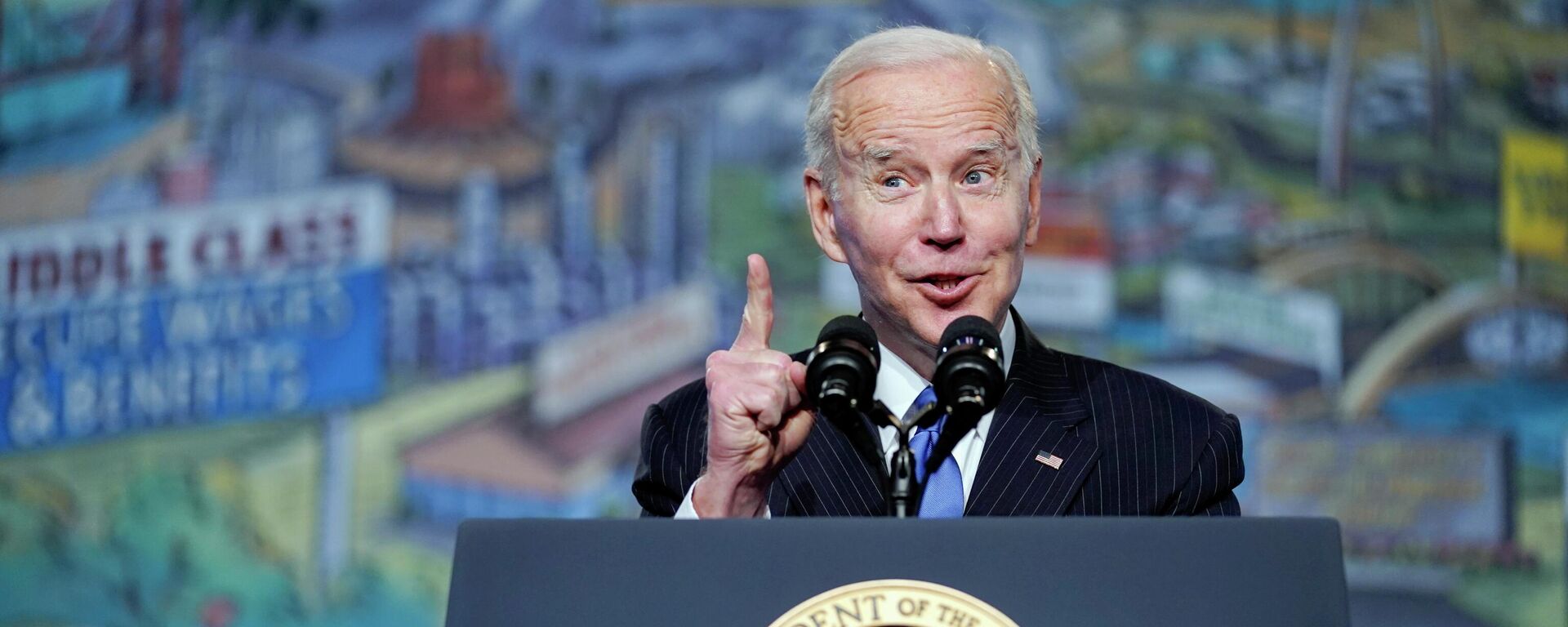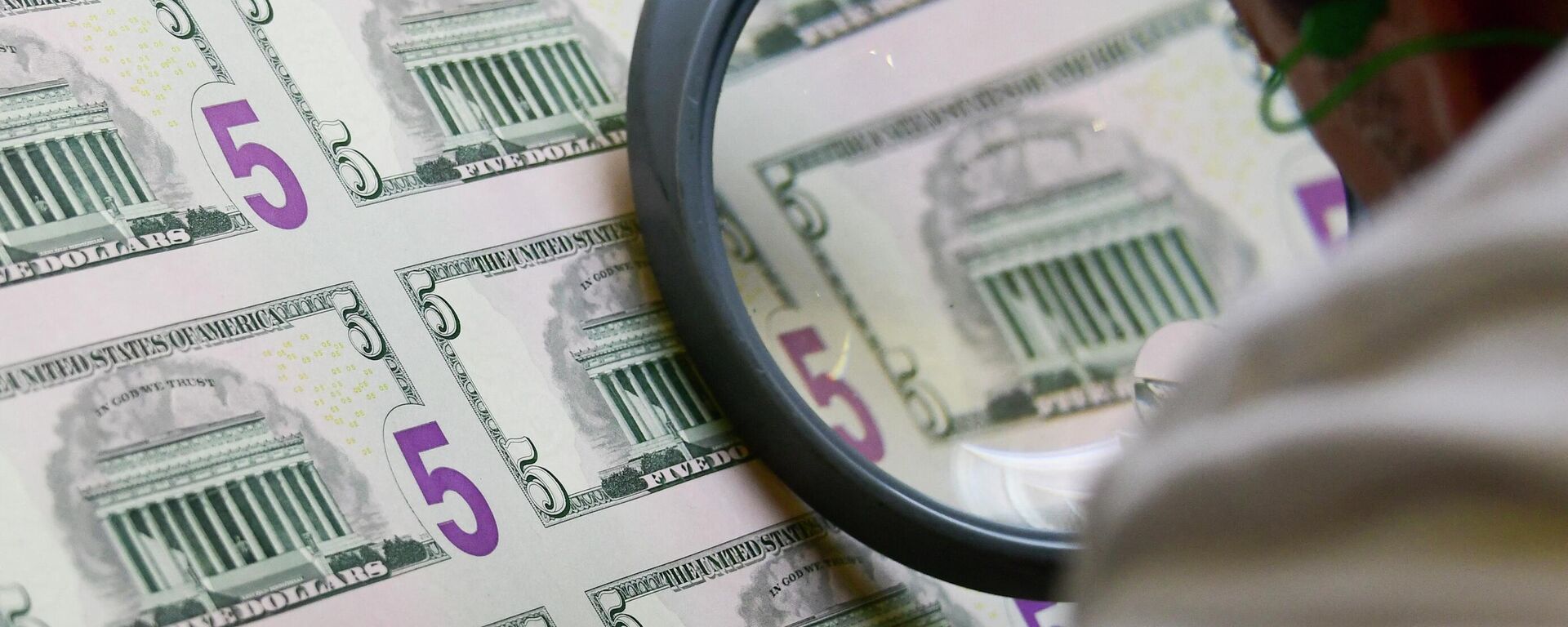https://sputnikglobe.com/20220725/federal-reserve-likely-to-raise-interest-rates-again-1097795699.html
Federal Reserve Likely To Raise Interest Rates Again
Federal Reserve Likely To Raise Interest Rates Again
Sputnik International
According to the Society of Human Resource Management, inflation has offset the increase in wages, causing a 2.7% decrease in inflation-adjusted hourly... 25.07.2022, Sputnik International
2022-07-25T23:57+0000
2022-07-25T23:57+0000
2022-07-25T23:57+0000
interest rates
us federal reserve
recession
national bureau of economic research
white house
https://cdn1.img.sputnikglobe.com/img/07e5/0b/1d/1091122895_0:0:3295:1853_1920x0_80_0_0_32fd162debfeef26ea1fdc8d873910c7.jpg
In a bid to fight record-high inflation, the Federal Reserve is expected to raise interest rates for the fourth time since March. The interest rate for borrowing will likely be increased to 2.25 - 2.5% later this week.With a strong job market and consumer spending still high, the Fed hopes that increasing rates will decrease demand without sending the United States into a recession.Previous attempts to reduce inflation by raising interest rates appear to have failed; inflation currently sits at a 40-year high of 9.1%. This is likely because there are a lot of factors besides borrowing that affect inflation that the Fed can do little about. Increased energy costs, food shortages, and supply chain issues cannot be solved by limiting borrowing.There are also signs that the US economy is already in a recession. Typically, a recession is defined by two consecutive quarters of the economy shrinking. When the government gives its quarterly report on the economy on Thursday, most expect it to show that the economy shrank again, making it two consecutive quarters that the total GDP of the economy decreased.However, the White House is arguing that the economy cannot be in a recession while the job market is so robust. The June job report indicated that 370,000 new jobs were added to the economy last month. Instead, the White House is pointing to the National Bureau of Economic Research as the barometer it will use to determine if the economy is in a recession. That nonprofit group of economists weighs other factors like inflation-adjusted wages and job growth to determine if an economy is in recession. However, it typically only declares a recession after the fact, when it is already clear the economy was in a recession.The rising interest rates are already having an effect on the economy. The rate on a 30-year home mortgage has increased to 5.5%, double what it was last year. As a result, home buying has decreased significantly, down 10.2% in May from the year prior.Raising interest rates will not just have an effect on the housing market, it will also affect those looking for auto loans and, crucially, business loans, which may slow hiring.Interest rates are expected to continue to increase even after the Fed raises rates later this week. Officials believe that the 2.25 - 2.5% rate will be high enough to stop stimulating the economy, but will not be high enough to lower demand. The Fed may then slowly increase the rate until it increases another 1 - 1.25% by the end of the year. They hope that will be enough to slow demand and get it in line with the current supply of goods.Currently, the Fed is more worried about slowing inflation than it is about inadvertently shrinking the economy. At a central banking forum in Portugal in June, Fed Chairman Jerome Powell indicated that inflation is the biggest threat to the economy. “Is there a risk that we would go too far [raising interest rates]? Certainly there’s a risk, but I wouldn’t agree that’s the biggest risk to the economy. The biggest mistake to make…would be to fail to restore price stability.”It is worth pointing out that in April of last year when inflation first started to rise, the Fed called it “transitory” and kept interest rates between 0 - 0.25% in an attempt to keep the economy growing as COVID-era lockdowns started to ease.
https://sputnikglobe.com/20220725/white-house-tries-to-redefine-recession-as-us-economy-bound-to-contract-for-second-quarter-in-row-1097789277.html
https://sputnikglobe.com/20220718/poll-93-of-americans-concerned-with-inflation-levels-amid-recession-fears-1097419775.html
Sputnik International
feedback@sputniknews.com
+74956456601
MIA „Rosiya Segodnya“
2022
News
en_EN
Sputnik International
feedback@sputniknews.com
+74956456601
MIA „Rosiya Segodnya“
Sputnik International
feedback@sputniknews.com
+74956456601
MIA „Rosiya Segodnya“
interest rates, us federal reserve, recession, national bureau of economic research, white house
interest rates, us federal reserve, recession, national bureau of economic research, white house
Federal Reserve Likely To Raise Interest Rates Again
According to the Society of Human Resource Management, inflation has offset the increase in wages, causing a 2.7% decrease in inflation-adjusted hourly earnings as of March of this year.
In a bid to fight record-high inflation, the Federal Reserve is expected to raise interest rates for the fourth time since March. The interest rate for borrowing
will likely be increased to 2.25 - 2.5% later this week.
With a strong job market and consumer spending still high, the Fed hopes that increasing rates will decrease demand without sending the United States into a recession.
Previous attempts to reduce inflation by raising interest rates appear to have failed; inflation currently sits at a 40-year high of 9.1%. This is likely because there are a lot of factors besides borrowing that affect inflation that the Fed can do little about. Increased energy costs, food shortages, and supply chain issues cannot be solved by limiting borrowing.
There are also signs that the US economy is already in a recession. Typically, a recession is defined by two consecutive quarters of the economy shrinking. When the government gives its quarterly report on the economy on Thursday, most expect it to show that the economy shrank again, making it two consecutive quarters that the total GDP of the economy decreased.
However, the White House
is arguing that the economy cannot be in a recession while the job market is so robust. The June job report indicated that 370,000 new jobs were added to the economy last month. Instead, the White House is pointing to the National Bureau of Economic Research as the barometer it will use to determine if the economy is in a recession. That nonprofit group of economists weighs other factors like inflation-adjusted wages and job growth to determine if an economy is in recession. However, it typically only declares a recession after the fact, when it is already clear the economy was in a recession.
The rising interest rates are already having an effect on the economy. The rate on a 30-year home mortgage has increased to 5.5%, double what it was last year. As a result, home buying has decreased significantly, down 10.2% in May from the year prior. Raising interest rates will not just have an effect on the housing market, it will also affect those looking for auto loans and, crucially, business loans, which may slow hiring.
Interest rates are expected to continue to increase even after the Fed raises rates later this week. Officials believe that the 2.25 - 2.5% rate will be high enough to stop stimulating the economy, but will not be high enough to lower demand. The Fed may then slowly increase the rate until it increases another 1 - 1.25% by the end of the year. They hope that will be enough to slow demand and get it in line with the current supply of goods.
Currently, the Fed is more worried about slowing inflation than it is about inadvertently shrinking the economy. At a central banking forum in Portugal in June, Fed Chairman Jerome Powell indicated that inflation is the biggest threat to the economy. “Is there a risk that we would go too far [raising interest rates]? Certainly there’s a risk, but I wouldn’t agree that’s the biggest risk to the economy. The biggest mistake to make…would be to fail to restore price stability.”
It is worth pointing out that in April of last year when inflation first started to rise, the
Fed called it “transitory” and kept interest rates between 0 - 0.25% in an attempt to keep the economy growing as COVID-era lockdowns started to ease.





